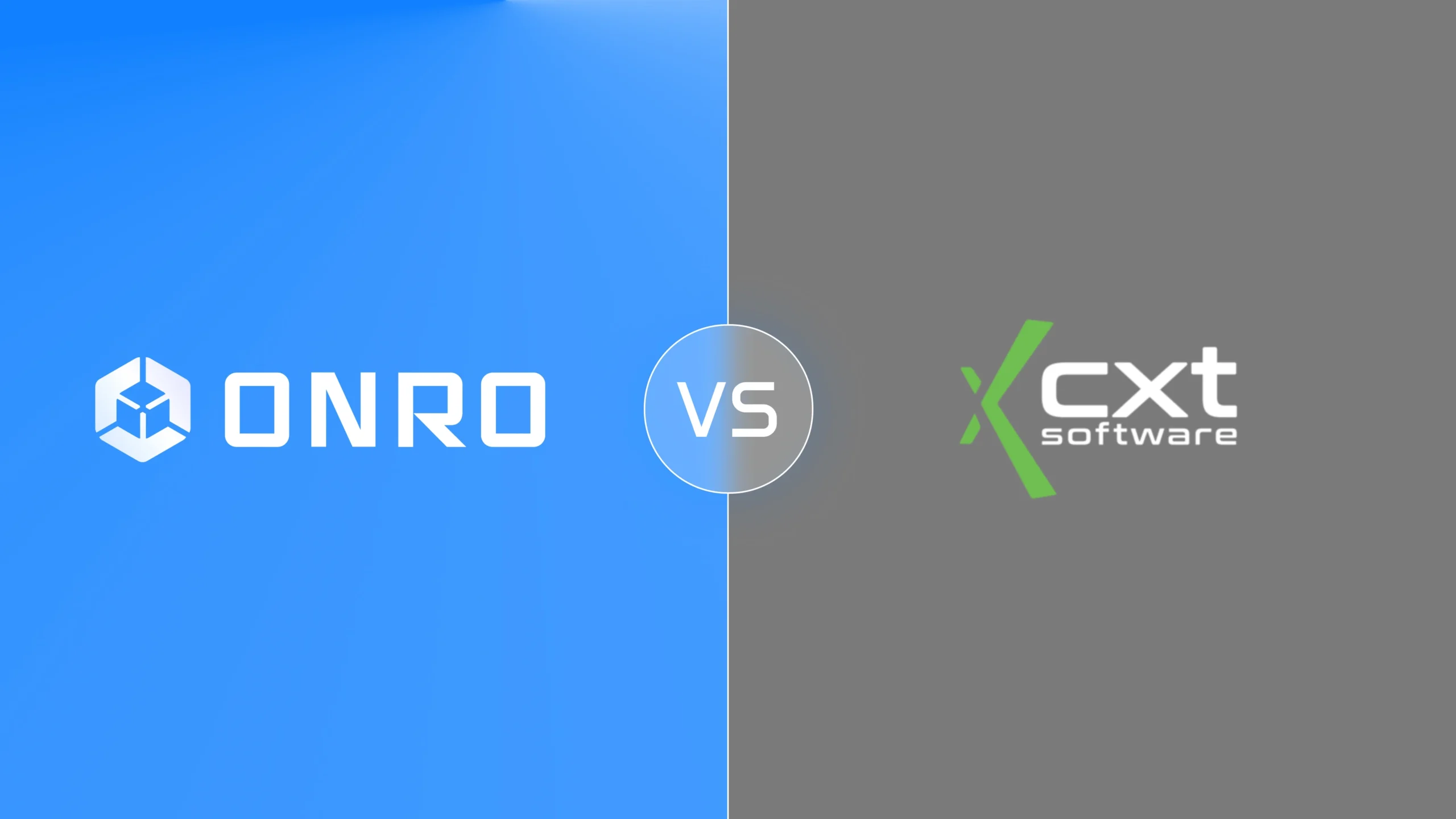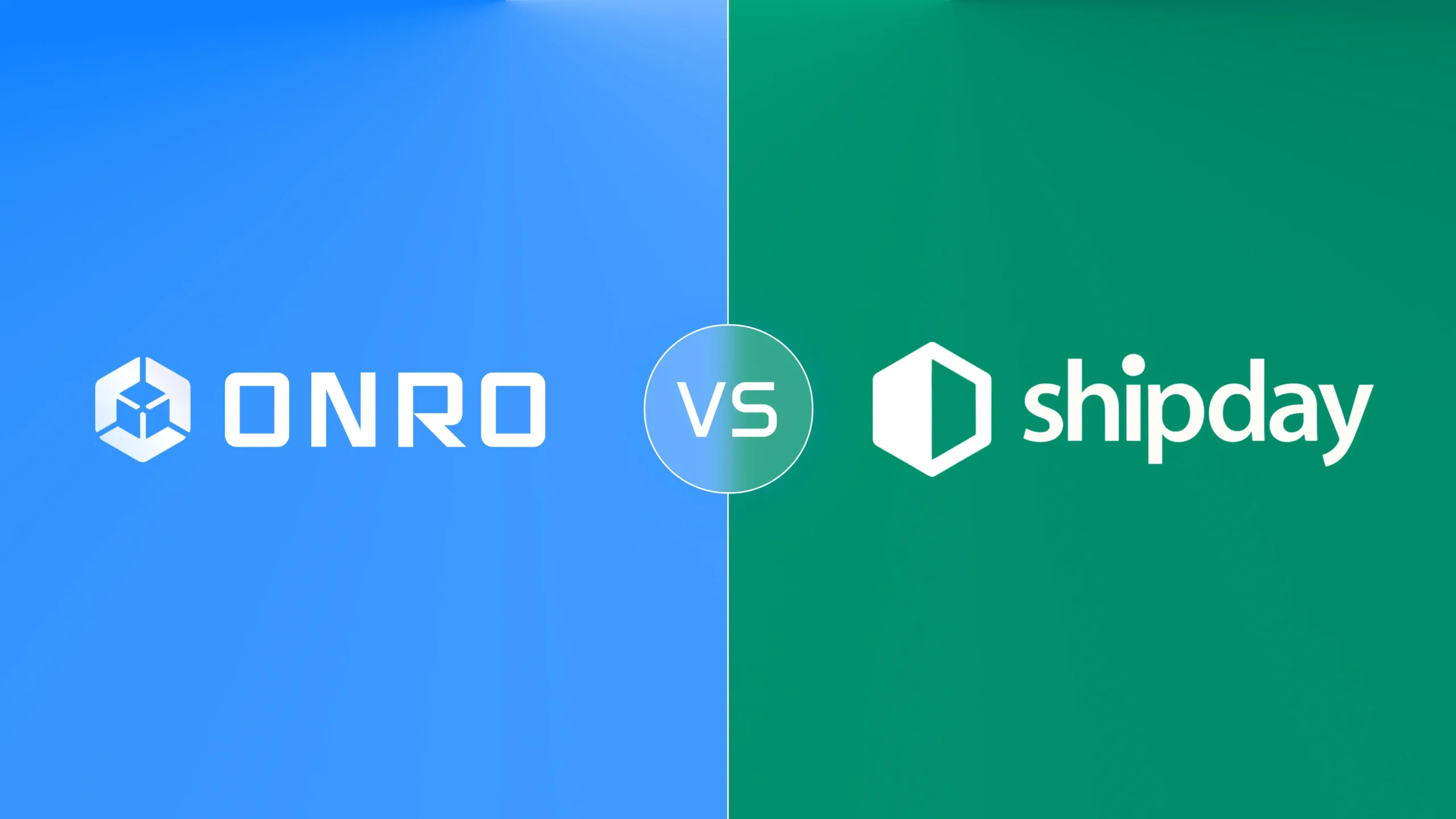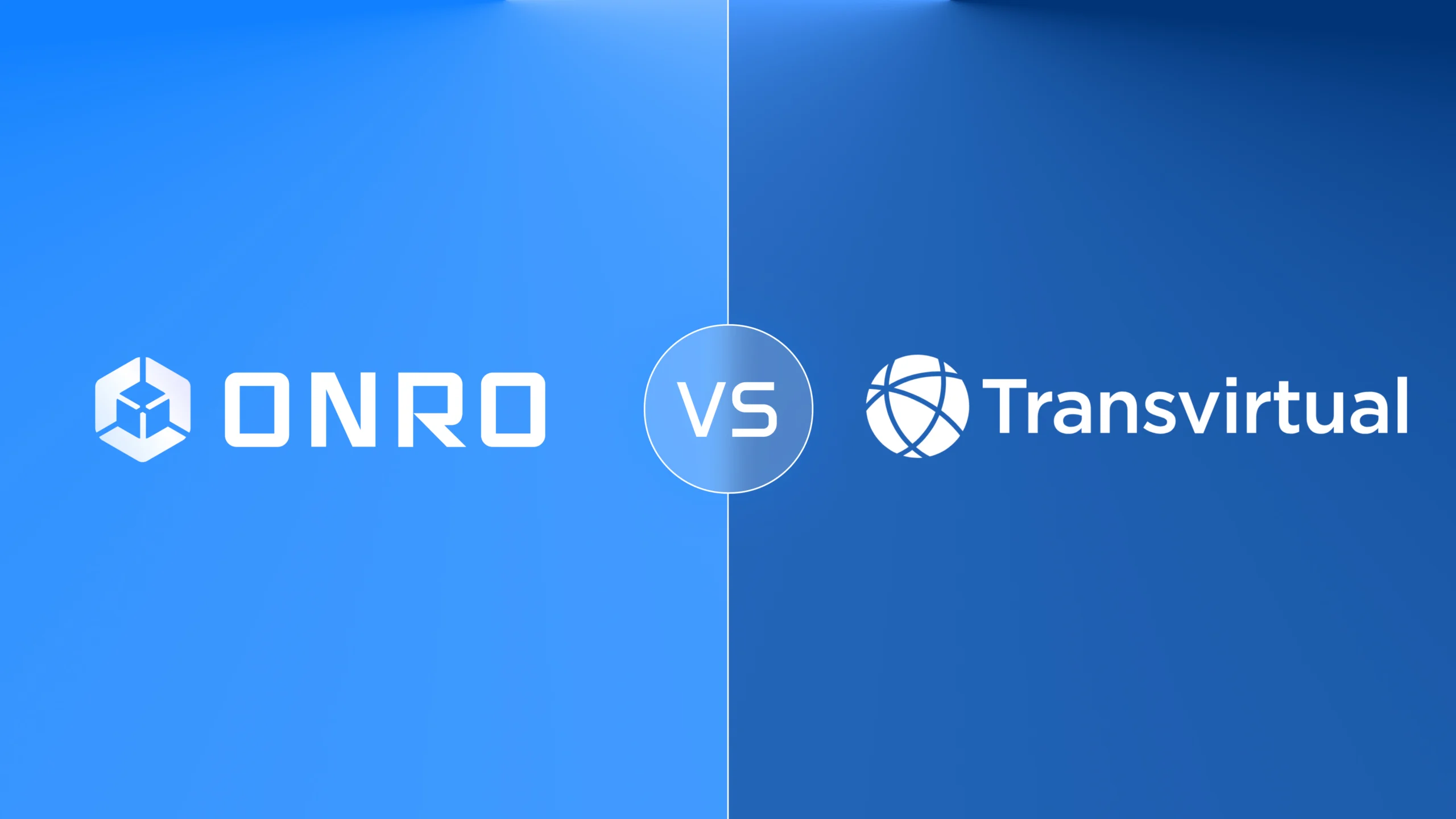The freight courier service is a type of courier service involved in the transportation of bigger, heavier, and bulk shipment along the roadways, airways, seaways, or rail.
Key Takeaways
-
Freight courier service is the best for shipments over 150 lbs or for bulk volume.
-
Uses either FTL (Full Truckload) or LTL (Less-Than-Truckload).
-
Freight transportation services are for pallets, crates, containers, or oversized items.
-
Loads consolidation could cut costs.
-
Whatever the cargo, it needs to be documented in full detail: BOL and customs forms.
-
Optional insurance for freight shipments, tracking, and special handling also exist.
-
It is slower than a parcel courier but offers more cost-efficient shipping and scalable solutions.
-
The services power supply chains, manufacturing, B2B trade, and international delivery.
Have heavy goods and shipments ever posed a problem for interstate or international movement? Freight courier services provide a reliable solution. Unlike standard couriers for couriering, freight couriering involves the transportation of heavyweight and bulky items via road, air, sea, or rail.
Freight couriers would be the perfect solution for those types of B2B delivery businesses that need a speedy, reliable, and cheap way to store pallets of inventory, industrial equipment, or consolidated container loads. Here, we will discuss what services a freight courier company offers, when to use freight versus parcel courier, and how to choose a partner that will keep your supply chain running smoothly.
Try Onro for Free
Get your free access to the Onro Fully White-label Courier Software.
What is Freight Courier Service?
Under the freight courier service, bulk goods are transported from one point to another in a more efficient manner. They deal with heavy goods, outsized cargo, and heavy equipment through trucks, trains, ships, or airplanes.
Thus, much of manufacturing shipping needs depends on freight shipments for deliveries, both within their countries and across international lines. Lined-up brands such as Apple, Shein, and Nike are using the services to ease supply-chain management and prepare for on-time delivery. Moreover, they may use ecommerce freight management like transportation management system (TMS) to increase efficiency of shipment.
A popular method to send freight is consolidation, wherein multiple small shipments are put together to fill a container or vehicle. This increases the utilization of space and thus reduces the shipping cost. Additionally, the freight agents may provide you with value-added services such as real-time tracking and insurance or custom delivery options suited toward the needs of a specific business or customer.
The term “freight” refers not only to the physical goods—ranging from raw materials and commodities to finished products—but also to the transportation fees. The goods are packed and containerized freight, or they can be palletized freight when the delivery is by air, sea, road, or rail at a less than enormous quantity.
How Does Freight Courier Service Work?
A freight courier service represents a chain of tightly designed, coordinated steps ensuring a smooth, efficient shipment flow from point A to point B.
Below is a brief outline of a typical shipment procedure from preparing your goods for transport, delivery, and after-sales care.
| Stage | What Happens | Why It Matters |
|---|---|---|
| 1. Getting Ready to Ship (Pre-Shipping) | – Collect shipment details (size, weight, origin, destination) – Pack securely (pallets, crates, wrap) and label properly – Choose best shipping method (air, sea, road) – Prepare important paperwork (customs, invoices) | Ensures your freight is safe, properly documented, and ready to move without delays or confusion. |
| 2. The Shipping Journey (Shipping Process) | – Arrange careful pickup with the right equipment – Track your shipment and keep you updated – Communicate immediately if any issues arise – Provide estimated delivery time | Keeps you informed and ensures your shipment moves smoothly toward its destination. |
| 3. Delivery and Aftercare (Post-Shipping) | – Confirm delivery with recipient’s signature – Manage returns or claims if anything is damaged or lost – Offer ongoing customs clearance support after delivery | Make sure your freight arrives safely and that any problems are resolved quickly and smoothly. |
Every stage requires attention; from packaging securely, through documentation, and even to communication during shipment. This chain of circumstances reduces causes for delay and protects your freight investment. Let’s now take a closer look at each stage.
1. Getting Ready to Ship (Pre-Shipping)
Before shipment goes out of your hands, an important checklist:
- All the details require collecting: You have to know exactly what you are sending, its size and weight, from where it is being sent, and to where it is to be delivered. If these things are wrong, the risk of accidents increases.
- Proper packaging: Packaging of freight is nothing more than securing items, whether on pallets, inside crates, or on wrapping. And the one essential thing is to label them properly so that the handlers know what it is that they are handling and how to handle it properly.
- Selection of shipping method: It is sometimes about getting the freight first-fast and by air freight. At other times, one goes slow because it pays- by sea or road. This helps you decide what is best for you.
- Arranging the documents: It may sound boring, but it is crucial. Customs documents, invoices, and contracts smooth out the process so freight does not get held as it crosses borders.
2. The Shipping Journey (Shipping Process)
After having been all nicely packed and ready:
- Gently pick it up: Big shipments must sometimes be loaded by special trucks, forklifts, or docks; it is not just dropping a box off at the post office!
- Movement-tracking: Tracking where your freight is every step of the way. You get updates to know if it is moving or close to arriving.
- Communication: If anything unexpected comes up — maybe a delay or paperwork snag — you should communicate with you and the transport team right away to sort it out.
- When to expect arrival: Either route-or mode-of-transport-based estimates of delivery dates are sometimes provided to relieve you from the doubt.
3. Delivery and Aftercare (Post-Shipping)
At the point of arrival of the project:
- Confirming delivery: There is usually someone on the other end to sign for it just in case everything arrives safely-being one last check to make sure nothing is missing or damaged.
- Handling returns or issues: When things go wrong—like a package getting damaged or lost—the service should handle returns, replacements, or claims promptly, ensuring you’re never left in the dark.
- Answering your questions: Everything is inconceivable without an exhibition of excellent service; if not, after delivery, would you stand aside when you have queries or need support?
Freight Courier vs. Standard Courier
Choosing one over the other is mostly an issue of the nature of the consignment, the size, and its urgency. Freight courier is mostly for the fast delivery of smaller parcels to local delivery and international destinations. Road freight handles bigger, heavier, or bulkier consignments cheaply.
These disparities are particularly essential when starting a delivery business since making the right choice clearly enhances bachelor operational efficiency.
| Aspect | Freight Courier | Standard Courier |
|---|---|---|
| Best For | Large, heavy, or bulk shipments | Fast delivery of small parcels |
| Cost | More cost-efficient for high-volume or heavy goods shipping loads | Costs increase quickly with weight and volume |
| Flexibility | Highly flexible scheduling and route customization | Fixed routes and strict schedules |
| Accessibility | Ideal for rural or hard-to-access locations | Limited access to remote areas |
| Tracking | Basic tracking, less real-time shipment tracking detail especially in groupage shipments | Advanced real-time tracking with minute-by-minute updates |
| Speed | Efficient for large shipments with direct transport; groupage slower | Very fast for small parcels with same-day delivery/next-day delivery options |
| Additional Notes | Supports weekend pickups and special handling | Optimized for last-mile delivery |
Cost: Optimized Shipping for High-Volume Loads
If a consignment includes many boxes, pallets, or extremely large articles, road freight remains a better-priced option. Otherwise, in courier services, the less weight or the smaller the size, the more the price sometimes gets increased; the road freight is hence somewhat meant for bigger shipments, giving better price-to-value or even better price-to-inches in the cases of longer distances or much frequent shipments.
Example: A business shipping 800 kg of goods weekly can save up to 40% by switching from parcel couriers to road freight providers.
Flexibility: Custom Scheduling and Route Control
Being able to arrange a certain pickup and delivery time makes road freight solutions rank very high in flexibility. This sort of shipment will also work from or into rural and hard-to-access locations, where couriers may be limited due to set routes.
Most courier services follow a certain route and set schedule, which may give the impression of being less adaptive, for example, during off-hours of the courier system.
Need weekend pickups or special handling? Road freight can be accommodated with ease.
Tracking: Advanced Visibility vs Basic Updates
In particular time-sensitive or very high-priority carriage, such transparency serves as profit. Most freight companies offer real-time tracking to keep the sender apprised of the exact locations of the parcel on a minute-by-minute basis.
There is road freight tracking, but it becomes less common the more your shipment is grouped with other consignments in a groupage set-up. Location updates mean nothing until one milestone pertaining to delivery manifests itself at the very last leg of the journey.
Speed: Prioritizing Urgency or Volume
Courier services deliver the fastest possible shipment, often on an immediate small-package basis. The basis of their services is often same-day or next-day. Infrastructure exists for the very last-mile fulfillment steps at the fastest speeds.
Whereas the dedicated road freight spills the time-sensitive large shipments into the point transport after the direct transfer, essentially, here time cannot be at the cost of capacity. Groupage services are suitable for deliveries of somewhat less urgency, though the time taken may be stretched a little.
Key Characteristics of Freight Courier Services
Whereas some features separate freight shipments from other modes of delivery, like courier shipping:
- Size: Freight services basically search for big or heavy articles having dimensions that are disallowed for a normal parcel under a parcel advertising system.
- Multimodal Shipping: Freight can be carried anywhere along a mode-land, rail, sea, or air, depending on factors categorized into different headings, such as time, cost, and distance.
- Complex Delivery Management: Freight shipments carry logistics wash customs clearances, warehousing, special oversized cargo delivery insurance, etc.
- Load Consolidation: They may be shipped either as LTL or FTL depending on the size of the shipments, depending on which is more optimal for cost and space layouts.
- Long-Distance and International Capability: Freight is to facilitate the efficient conveyance of goods over long distances and among countries and continents.
- Special Cargo Handling: Freight companies handle all sorts of goods that require special consideration for their storage or movement: fragile goods, hazardous goods, or perishable goods.
- Sharing Freight Space: Shipments may be loaded with others into containers or vehicles, thereby jeopardizing scheduling and delivery times.
Examples of Freight Courier Services
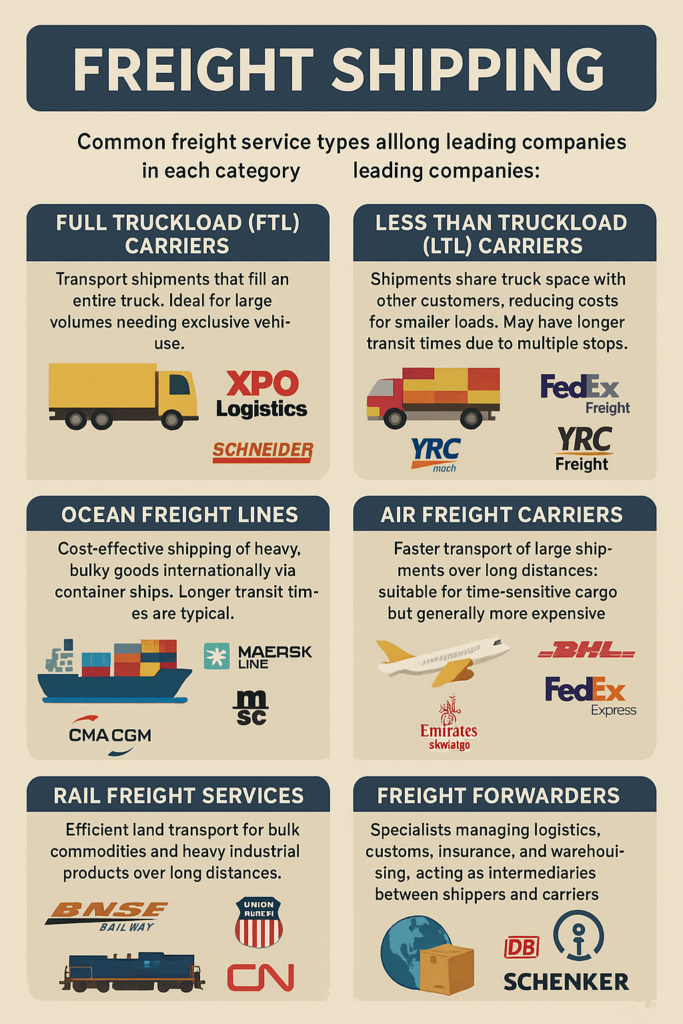
Freight shipping involves moving large or bulky goods efficiently across distances. Below are common freight service types along with leading companies in each category:
Full Truckload Shipping (FTL)
The freight goes to occupy landing every inch of the trailer, minimizing handling and transit time for large shipments requiring whole truck spaces. Unless your shipment fills the whole truck completely, paying for full capacity ensures that your shipment is not mixed with any other freight or damaged in any way.
Examples: XPO Logistics, J.B. Hunt, Schneider National
Less than Truckload Shipping (LTL)
LTL combines several smaller shipments from different shippers to utilize the trailer to full capacity. Being good for shipments between one and six pallets or under 14 linear feet, this option works cheaper for separate small businesses. The downside is that LTL shipments are loaded and unloaded multiple times at various stops, increasing handling and possibly transit time.
Examples: FedEx Freight, UPS Freight, YRC Freight
Ocean Freight Lines
Container shipping is a budget-friendly method for transporting heavy and bulky goods to foreign countries. It usually entails longer transit times.
Examples: Maersk Line, Mediterranean Shipping Company (MSC), CMA CGM
Air Freight Carriers
A quick transportation method for big shipments over long distances where time is precious, is very rarely inexpensive.
Examples: DHL Aviation, FedEx Express, Emirates SkyCargo
Rail Freight Logistics Services
Land transportation for bulk products and very heavy industrial goods with industrial courier service.
Examples: BNSF Railway, Union Pacific, Canadian National Railway
Freight Forwarders
Logistics, customs, insurance, and warehousing are managed by these experts, essentially acting as agents connecting shippers and carriers.
Examples: Kuehne + Nagel, DB Schenker, Expeditors International
Key Differences between FTL vs. LTL
| Aspect | Full Truckload (FTL) | Less-Than-Truckload (LTL) |
|---|---|---|
| Cost | Higher cost, but exclusive truck space | Lower cost, pay only for used space |
| Delivery Time | Direct transit, predictable schedules | Multiple stops, less predictable delivery |
| Handling | Single load/unload, less damage risk | Multiple handling points, higher damage risk |
| Ideal Shipment | Large, time-sensitive, full truck loads | Smaller shipments, cost-sensitive loads |
Factors to Consider When Choosing between FTL and LTL
Based on shipment size, urgency, and budget considerations, this is the choice between FTL and LTL. For bigger loads that could be time-sensitive, go for FTL if you wish for faster and safer delivery in exchange for your money. And for smaller loads that are not rushed, LTL is less costly.
Freight Courier Advantages
Fast and Timely Delivery
Freight courier services guarantee fast delivery and timely shipments and comprise an excellent modality for companies that want fast and dependable transport. During every stage of the shipment, shippers can track their cargo in real time.
Cost-Efficiency and Affordability
Being cost-effective freight solutions is one of the most common advantages. Couriers optimize routes and share loads, offering affordable shipping options that help reduce overall logistics expenses without compromising service quality.
Reliability and Security
A freight shipment needs to be evaluated on reliability. Such things require specialized handling and more stringent safety measures from very professional courier companies in order to safeguard fragile, sensitive items from damage.
Flexible Delivery Options and Reach
The delivery reach is sufficiently wide for the freight courier companies to provide a tailor-made shipping solution to suit a business’s needs. Other services that they provide may include door-to-door delivery, which is convenient for the customer and in fact, cuts down on handling.
Customer Satisfaction and Support
Such freight courier companies offer price quotation, shipment arrangement, shipment information, and responsive communication technology at the client’s shipping convenience and issue resolution as a way of customer satisfaction.
Environmental Sustainability
Environmental sustainability matters have become so important in the perception of many freight enterprises that going green now is another way of logistic integration towards minimizing their carbon footprint for an environmentally friendly shipment.
Seamless Freight Delivery Ends with the Last Mile
When we are talking about good courier companies, speedy dispatches, freight shipment, punctual deliveries, etc., these two million all go towards proving the point. The very few miles that deliver goods into the hands of customers are the last few miles where customer bothering or pleasing happens, generally called the last mile. That’s where Onro comes in.
Try Onro for Free
Get your free access to the Onro Fully White-label Courier Software.
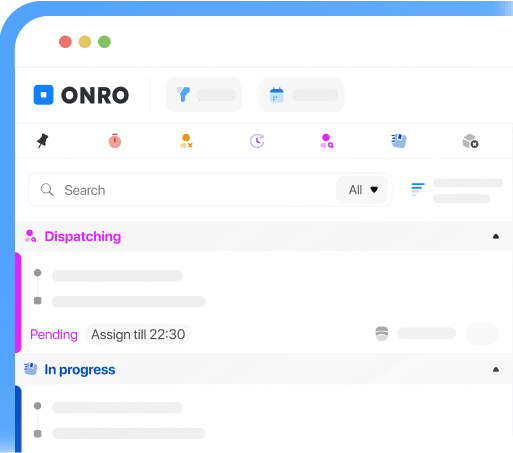
Some instances: from delivery of already bonded pallets from a regional depot to sharing deliveries around urban B2C for ocean freight; Onro’s tech-savvy last-mile delivery software is covering that last gap so that fulfillments are less time consuming, smarter systems, and much more reliable mechanization and maintenance.
- Real-time tracking
- Smart route optimization
- Fully integrated with your freight ops
- Operating from the city scale down to really remote zones
When Should You Use Freight Courier Service or Standard Courier Service?
For speed and convenience to ship small parcels capable of fast-moving delivery, come courier services. Freight services, on the other hand, are flexible and economical for shipping large and bulky shipments or some specialized ones with a longer delivery time. Whether to go by courier or freight depends on the consignment size, urgency, and nature.
Courier Services: Best for Small, Urgent Packages
Rendering fast and reliable delivery services, courier services deal with small package shipments. Time-sensitive items need to be delivered door-to-door. For example, we are talking about urgent documents, a few parcels, or rush retail shipments.
Freight Services: Ideal for Large, Bulk Shipments
Freight shipping refers to large, heavy, and bulky goods beyond parcel size or weight limits and measurements. Freight shipping is done via trucks, trains, ships, or airplanes from city to city or country to country. Besides, Freight is also the preferred choice for businesses needing cost-effective bulk shipping and specialized handling of fragile or hazardous cargo.
Domestic vs. International Shipping: What’s the Difference?
One must know the core differences of domestic shipping as opposed to international shipping so as to make the right choice of courier. Costs, throughput time, documentation, and restrictions all vary, and each has its storm of advantages and pitfalls.
Shipping Complexity and Customs Clearance
International shipping involves customs regulations, border control, and international compliance. These processes can give more transit time because of the inspections at customs and some more legal paperwork.
Domestic shipping makes it easy. No walls coming, meaning faster deliveries with fewer logistics headaches.
Shipping Cost Comparison
Lower distances are accommodated and less regulatory fees are imposed, so domestic shipping would still be the cheapest option. The price is charged depending on the size and weight of the package as well as the agreed window of delivery. International shipping will, however, add duties and import taxes besides the long transit time to its bill, thereby making the cost really high.
Delivery Speed and Timeframe
Many carriers also provide next-day or same-day delivery within the country. Domestic delivery is widely regarded as fast due to short distances and few regulatory requirements. On an international scale, shipment timings are subject to numerous changes in relation to distance, clearance processes, and modes chosen for shipment.
Depending on how urgent the need is, options such as DHL Express are available to speed delivery.
Freight Documentation Requirements
- Domestic freight services usually requires:
- Shipping label
- Invoice
- International courier service requires additional documents, such as:
- Customs declaration
- Commercial invoice
- Certificate of origin (in some cases)
Having proper documents results in regulatory compliance and smooth clearance at the borders.
Shipping Restrictions
Domestic shipments face fewer restrictions, typically limited to country-specific prohibited items.
International shipments, however, must comply with various national laws. These can include:
- Product bans
- Safety certifications
- Trade agreement compliance
- Import restrictions on certain goods
Always check the destination country’s regulations before shipping internationally.
Quality Control and Customer Support
Domestic shipments give businesses greater control over the supply line. They can go through an inspection to spot the problem and immediately address the customer’s concern.
Add complexity to coordination due to time zone differences and third-party delays.
Domestic vs. International Courier Services: Choosing the Right Courier Service for Your Needs
| Factor | Domestic Courier Service | International Courier Service |
|---|---|---|
| Destination | Within the country | Cross-border freight shipping or overseas delivery |
| Urgency | Faster delivery windows, often same-day or next-day | Slower transit, unless using express international services |
| Budget | More cost-effective; minimal fees | Higher cost due to customs duties, taxes, and long-distance transportation |
| Special Handling | Suitable for fragile or special items within local boundaries | Ensure courier supports fragile, hazardous, or temperature-sensitive goods |
| Reliability & Reputation | Choose a provider with strong domestic performance and local knowledge | Research international ratings, delivery success rates, and customs experience |
Key Considerations When Choosing a Freight Courier
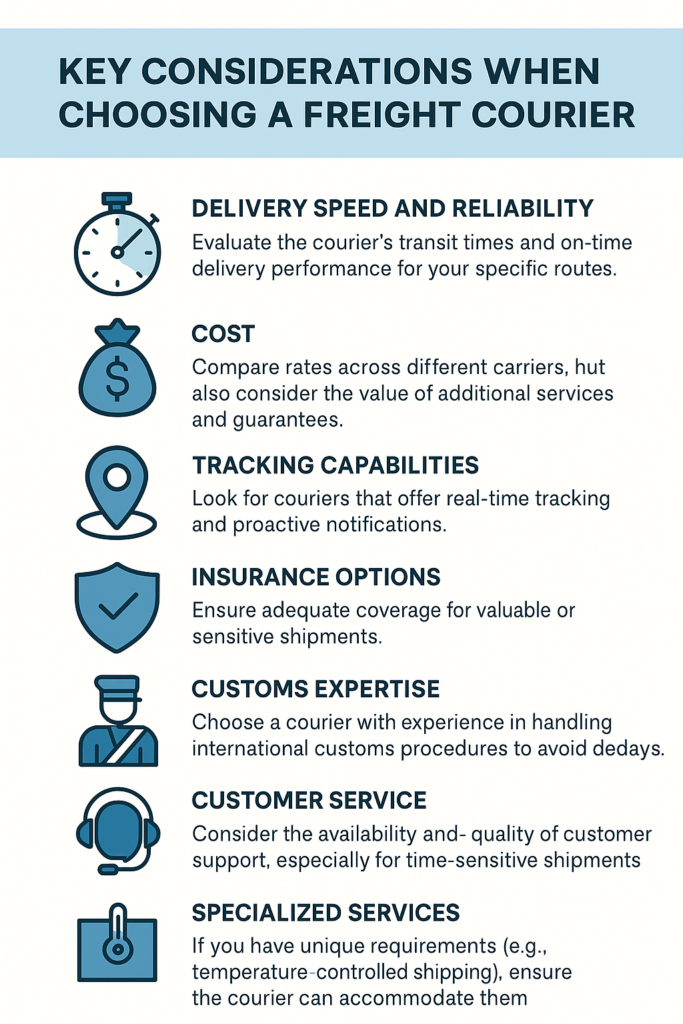
It is important for companies that deal with bulky and heavy commodities to choose the right freight shipping company. The choice will affect the price, speed of delivery, and satisfaction of customers, depending on whether one decides to take freight or parcel service. Some of the major parameters are listed below:
1. Freight Type Compatibility
Ensure that the freight can be handled by the courier: LTL (Less Than Truckload), FTL (Full Truckload), palletized goods, or oversized items.
2. Pricing and Rate Transparency
The charges for freight shipment usually comprise a base rate and some additional fees. Ask for a clear breakdown of their charges, including fuel surcharge, liftgate fee, and residential delivery fee.
3. Transit Times and Reliability
Generally, freight services have longer delivery windows. If your courier assures a dependable transit time and maintains an impeccable record of deliveries on time, that’s a plus.
4. Tracking Capabilities
It is important to select one that makes shipment visibility available in the form of GPS tracking methods or freight portals. With real-time updates, you are able to properly strategize your operations and handle customer inquiries.
5. Insurance and Liability Coverage
Goods in freight compromising very high value or utmost risk remain. The considered courier must furnish sufficient liability and should offer optional freight insurance coverage.
6. Special Handling Services
The courier can help secure specialized treatments, climate control, and hazmat registration for fragile, temperature-sensitive, and hazardous freight.
7. Service Area and Network Strength
Picking a courier will also require a scrutiny of their regional, national, or international reach, especially if your shipments need to be carried to the countryside or to more remote areas.
8. Freight Documentation Support
For shipments abroad, it is preferable to rely on couriers that will assist you with preparing the Bill of Lading (BOL), customs forms, and commercial invoices.
FAQ| Freight Courier Service
Shipping transports cargo of great size and bulk, being very heavy on road or air or sea or rail.
Domestics will take from 1 to 5 days; international freight will depend on the distance and mode from five to twenty.
Freight deliveries include items weighing more than 150 lbs, most of them having palletized or containerized bulk shipments.
A very small distinction is the size of the parcels; just the size of loads determines courier the service from freight.
Standard freight will be slower than parcel delivery, usually express freight anywhere from 1 to 3 days.
Conclusion
Freight courier services offer quick shipment of large or bulk cargoes. But the final steps, last-mile delivery, can also make-or-break the customer experience- that is where Onro comes into the picture. Real-time tracking, smart routing, and seamless integration help you manage the final mile.
